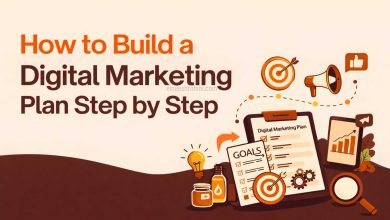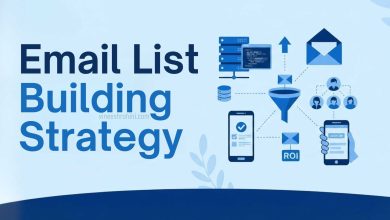Email Marketing vs WhatsApp Marketing – Which is The Best One ?
Email marketing and WhatsApp marketing are two popular forms of digital marketing that businesses use to reach out to their target audience. While both methods have their strengths and weaknesses, each one can be effective in different situations. In this essay, we will explore the differences between email marketing and WhatsApp marketing and which one may be more effective for businesses.
Email marketing is a form of digital marketing that involves sending promotional messages or newsletters to a list of subscribers via email. Email marketing allows businesses to reach a large audience and can be used for a variety of purposes, such as promoting products or services, driving traffic to a website, or generating leads. Email marketing campaigns can be customized to target specific demographics or interests, and they often include a call-to-action to encourage recipients to take action, such as making a purchase or signing up for a newsletter.
WhatsApp marketing, on the other hand, is a form of digital marketing that involves sending promotional messages to customers or prospects via WhatsApp, a messaging app that allows users to send text messages, voice messages, images, and videos. WhatsApp marketing is a relatively new form of digital marketing, but it has gained popularity due to its high open rates and engagement levels. WhatsApp marketing can be used for a variety of purposes, such as sending promotional offers, providing customer support, or delivering personalized messages to individual customers.
Get Amazing WhatsApp Bulk Sender Software :
One of the main differences between email marketing and WhatsApp marketing is the level of personalization. Email marketing campaigns can be customized to target specific demographics or interests, but WhatsApp marketing allows businesses to send personalized messages to individual customers. This level of personalization can increase engagement and build stronger relationships between businesses and their customers.
Another difference between email marketing and WhatsApp marketing is the cost. Email marketing campaigns can be relatively inexpensive, as businesses can use free or low-cost email marketing software to send messages to their subscribers. WhatsApp marketing, on the other hand, may require the use of paid services or the creation of a WhatsApp Business account, which can be more expensive.
One advantage of email marketing over WhatsApp marketing is the ability to track and measure campaign performance. Email marketing software often includes analytics tools that allow businesses to track open rates, click-through rates, and conversion rates. This information can be used to optimize future campaigns and improve overall performance. WhatsApp marketing, on the other hand, may not provide as much data or analytics, which can make it more challenging to measure the success of a campaign.
On the other hand, one advantage of WhatsApp marketing over email marketing is the high engagement levels. WhatsApp messages have a high open rate, as most people check their WhatsApp messages regularly. Additionally, WhatsApp allows businesses to send multimedia messages, such as images and videos, which can be more engaging than text-only messages.
In conclusion, both email marketing and WhatsApp marketing have their strengths and weaknesses, and the effectiveness of each method may depend on the specific needs of a business. Email marketing may be more effective for businesses that require detailed analytics and targeting options, while WhatsApp marketing may be more effective for businesses that value personalized communication and high engagement levels. Ultimately, the best approach is to use a combination of both methods to reach a wide audience and build strong relationships with customers.
Get : 30,000 Gigantic Email Sequence Bundle
Email Marketing Pros and Cons
Email marketing is a form of digital marketing that involves sending promotional messages or newsletters to a list of subscribers via email. While email marketing can be an effective way for businesses to reach their target audience and achieve their marketing goals, there are also some potential drawbacks to consider. In this essay, we will explore the pros and cons of email marketing.
Pros:
- Cost-effective: Email marketing can be a cost-effective way for businesses to reach a large audience. Many email marketing services offer free or low-cost plans, which can be a more affordable option than traditional marketing methods.
- Customizable: Email marketing campaigns can be customized to target specific demographics or interests. This level of customization can improve the effectiveness of email campaigns and increase engagement rates.
- High ROI: Email marketing campaigns can provide a high return on investment (ROI), as they can generate leads and sales for businesses. According to some studies, email marketing has an average ROI of $38 for every $1 spent.
- Measurable: Email marketing campaigns can be tracked and measured using analytics tools, which can provide valuable insights into campaign performance. This information can be used to optimize future campaigns and improve overall results.
- Easy to share: Email marketing messages can be easily shared with others, which can increase the reach of a campaign and generate more leads and sales for businesses.
Get : 1 Crore Indian Online Shoppers Marketing Database
Cons:
- Spam filters: Email marketing messages can sometimes be filtered into spam folders, which can reduce the effectiveness of a campaign. To avoid this, businesses need to ensure that their email campaigns comply with spam laws and guidelines.
- Unsubscribe rates: Some subscribers may choose to unsubscribe from email marketing lists, which can reduce the size of a businesses’ email list and make it more challenging to reach their target audience.
- Design limitations: Email marketing messages may have design limitations, as they need to be optimized for different email clients and devices. This can make it more challenging to create visually appealing campaigns.
- Opt-in requirements: Email marketing campaigns require subscribers to opt-in, which means that businesses need to have a list of subscribers before they can start sending emails. This can take time and effort to build a quality email list.
- Over-saturation: Email marketing messages can sometimes be over-saturated, as many businesses use email marketing to reach their target audience. This can make it more challenging for businesses to stand out and achieve their marketing goals.
In conclusion, email marketing has both pros and cons that businesses need to consider before implementing an email marketing campaign. While email marketing can be an effective way for businesses to reach their target audience and achieve their marketing goals, it is important to be aware of the potential challenges and limitations of this marketing method. By carefully planning and executing email marketing campaigns, businesses can increase engagement, generate leads and sales, and improve overall marketing results.
Get Amazing WhatsApp Bulk Sender Software :
WhatsApp Marketing Pros and Cons
WhatsApp marketing is a form of digital marketing that involves sending promotional messages or updates to customers via the WhatsApp messaging platform. While WhatsApp marketing can be an effective way for businesses to reach their target audience and achieve their marketing goals, there are also some potential drawbacks to consider. In this essay, we will explore the pros and cons of WhatsApp marketing.
Pros:
- High engagement rates: WhatsApp messages have high engagement rates compared to other forms of digital marketing, as users are more likely to open and read messages received through WhatsApp than emails or SMS.
- Personalized communication: WhatsApp marketing allows businesses to communicate with customers on a more personal level. This personalized communication can improve customer satisfaction and loyalty.
- Cost-effective: WhatsApp marketing can be a cost-effective way for businesses to reach their target audience. The WhatsApp platform is free to use, and businesses can send messages to their customers without incurring additional costs.
- Instant communication: WhatsApp messages are sent and received in real-time, allowing businesses to quickly respond to customer inquiries or send timely updates.
- Easy to share: WhatsApp messages can be easily shared with others, which can increase the reach of a campaign and generate more leads and sales for businesses.
Get : 30,000 Gigantic Email Sequence Bundle
Cons:
- Privacy concerns: WhatsApp marketing can raise privacy concerns for customers, as they may not want to receive promotional messages on a platform that they use for personal communication.
- Limited automation: WhatsApp marketing does not have the same level of automation capabilities as email marketing. Businesses may need to spend more time sending individual messages to customers, which can be time-consuming.
- Limited targeting options: WhatsApp marketing does not have the same level of targeting options as other forms of digital marketing. Businesses may not be able to target specific demographics or interests as effectively.
- Opt-in requirements: Similar to email marketing, WhatsApp marketing requires customers to opt-in to receive messages. Businesses need to have a list of subscribers before they can start sending messages, which can take time to build.
- Platform limitations: WhatsApp marketing has limitations in terms of the type of content that can be shared. For example, businesses cannot send promotional images or videos to customers via WhatsApp.
In conclusion, WhatsApp marketing has both pros and cons that businesses need to consider before implementing a WhatsApp marketing campaign. While WhatsApp marketing can be an effective way for businesses to reach their target audience and achieve their marketing goals, it is important to be aware of the potential challenges and limitations of this marketing method. By carefully planning and executing WhatsApp marketing campaigns, businesses can increase engagement, generate leads and sales, and improve overall marketing results.
Get : 1 Crore Indian Online Shoppers Marketing Database
Email Marketing vs WhatsApp Marketing Major Difference
Email marketing and WhatsApp marketing are both popular forms of digital marketing, but they have some significant differences that businesses need to consider when choosing between them. In this essay, we will explore the major differences between email marketing and WhatsApp marketing.
- Communication channels: Email marketing involves sending promotional messages or newsletters to a list of subscribers via email. On the other hand, WhatsApp marketing involves sending promotional messages or updates to customers via the WhatsApp messaging platform. While both channels allow businesses to reach their target audience, they have different user behaviors and preferences.
- User base: Email marketing has a wider user base compared to WhatsApp marketing. According to some estimates, there are more than 4.1 billion email users worldwide, while WhatsApp has around 2 billion users. While WhatsApp is popular in certain regions and demographics, businesses may not be able to reach as wide an audience as they can through email marketing.
- Engagement rates: WhatsApp marketing has higher engagement rates compared to email marketing. WhatsApp messages have an open rate of around 98%, while email open rates vary between 15-25% depending on the industry. Additionally, WhatsApp messages have a higher click-through rate compared to email.
- Personalization: WhatsApp marketing allows businesses to communicate with customers on a more personal level compared to email marketing. WhatsApp messages can be tailored to individual customers, and businesses can use customer data to provide more personalized recommendations and promotions. Email marketing also allows for personalization but may not be as targeted as WhatsApp marketing.
- Automation: Email marketing offers more automation capabilities compared to WhatsApp marketing. Businesses can set up automated email campaigns that trigger based on user behavior, such as signing up for a newsletter or abandoning a shopping cart. WhatsApp marketing does not have the same level of automation capabilities, as each message needs to be manually sent.
- Content type: Email marketing allows businesses to send a wide range of content types, including text, images, videos, and links. WhatsApp marketing, on the other hand, has some limitations on the type of content that can be shared. Businesses cannot send promotional images or videos to customers via WhatsApp.
In conclusion, email marketing and WhatsApp marketing have some significant differences that businesses need to consider when choosing between them. While email marketing has a wider user base and more automation capabilities, WhatsApp marketing has higher engagement rates, allows for more personalization, and has limitations on the type of content that can be shared. Ultimately, businesses need to evaluate their marketing goals, target audience, and budget to determine which marketing channel will be most effective for them.
Email Marketing vs WhatsApp Marketing, Which is the best one ?
It’s impossible to say which one is the “best” as it depends on a business’s specific goals and target audience.
Get Amazing WhatsApp Bulk Sender Software :




